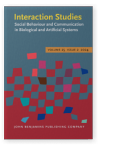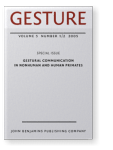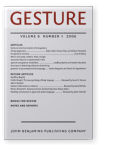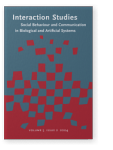Simone Pika
List of John Benjamins publications for which Simone Pika plays a role.
Journals
ISSN 1572-0373 | E-ISSN 1572-0381
Book series
Titles
Developments in Primate Gesture Research
Edited by Simone Pika and Katja Liebal
[Gesture Studies, 6] 2012. xiii, 256 pp.
Subjects Cognition and language | Evolution of language | Gesture Studies
Gestural Communication in Nonhuman and Human Primates
Edited by Katja Liebal, Cornelia Müller and Simone Pika
[Benjamins Current Topics, 10] 2007. xiv, 284 pp.
Subjects Cognition and language | Cognitive psychology | Evolution of language | Gesture Studies | Signed languages
Gestural Communication in Nonhuman and Human Primates
Edited by Katja Liebal, Cornelia Müller and Simone Pika
Special issue of Gesture 5:1/2 (2005) 324 pp.
Subjects Cognitive psychology | Communication Studies | Signed languages
2019 A new window onto animal culture: The case of chimpanzee gesturing Anthropology of Gesture, Brookes, Heather and Olivier Le Guen (eds.), pp. 239–260 | Article
Scientific interest in the diversity of gestural signalling dates back to the figure of Charles Darwin. More than a hundred years later, there is a considerable body of work describing human gestural diversity across languages and cultures. However, the question of communicative culture in our… read more
2014 How do modelled gestures influence preschool children’s spontaneous gesture production? Social versus semantic influence Gesture 14:1, pp. 1–25 | Article
Around the age of nine months, children start to communicate by using first words and gestures, during interactions with caregivers. The question remains as to how older preschool children utilise the gestures they observe into their own gestural representations of previously unseen objects. Two… read more
2012 Handedness for manual gestures in great apes: A meta-analysis Developments in Primate Gesture Research, Pika, Simone and Katja Liebal (eds.), pp. 93–112 | Article
Left hemisphere dominance for language and speech is a prominent feature of the human brain. Some have suggested that left hemisphere lateralization for language in modern humans evolved from an existing lateralized system for gestural communication in the common ancestor of humans and apes. Here,… read more
2012 Where next? Developments in Primate Gesture Research, Pika, Simone and Katja Liebal (eds.), pp. 241–252 | Article
2012 Introduction: Developments in primate gesture research Developments in Primate Gesture Research, Pika, Simone and Katja Liebal (eds.), pp. 1–12 | Article
2012 A call for conformity: Gesture studies in human and non-human primates Developments in Primate Gesture Research, Pika, Simone and Katja Liebal (eds.), pp. 147–164 | Article
Many advances in the study of gesture have been accomplished; however idiosyncratic methodologies and definitions have been applied for different subject pools in human and non-human animals. Since gesture use in our phylogeny dates back at least to other primates, a useful framework for furthering… read more
2012 Requesting behaviours within episodes of active sharing: A new look on chimpanzee signalling Developments in Primate Gesture Research, Pika, Simone and Katja Liebal (eds.), pp. 199–222 | Article
Similarly to humans, one of human’s closest living congener, chimpanzees (Pan troglodytes), have been observed to share food between unrelated individuals regardless of age and sex. The most remarkable cases of extended food sharing episodes including active sharing occur after chimpanzees have… read more
2008 8. Evidence for intentional and referential communication in great apes? The Shared Mind: Perspectives on intersubjectivity, Zlatev, Jordan, Timothy P. Racine, Chris Sinha and Esa Itkonen (eds.), pp. 165–186 | Article
Human speech is frequently accompanied by movements of the arms and hands termed gestures. The majority of these gestures is invented spontaneously and is highly iconic but some gestures are used functionally in ways very similar to speech that is symbolically, referentially, based on… read more
2007 Introduction: Gestural communication in nonhuman and human primates Gestural Communication in Nonhuman and Human Primates, Liebal, Katja, Cornelia Müller and Simone Pika (eds.), pp. 1–4 | Article
2007 The gestural communication of apes Gestural Communication in Nonhuman and Human Primates, Liebal, Katja, Cornelia Müller and Simone Pika (eds.), pp. 37–51 | Article
Gestural communication of nonhuman primates may allow insight into the evolutionary scenario of human communication given the flexible use and learning of gestures as opposed to vocalizations. This paper provides an overview of the work on the gestural communication of apes with the focus on their… read more
2006 Gestural communication of orangutans (Pongo pygmaeus) Gesture 6:1, pp. 1–38 | Article
2005 Introduction: Gestural communication in nonhuman and human primates Gestural Communication in Nonhuman and Human Primates, Liebal, Katja, Cornelia Müller and Simone Pika (eds.), pp. 1–5 | Article
2005 Gestural communication of apes Gestural Communication in Nonhuman and Human Primates, Liebal, Katja, Cornelia Müller and Simone Pika (eds.), pp. 41–56 | Article
Gestural communication of nonhuman primates may allow insight into the evolutionary scenario of human communication given the flexible use and learning of gestures as opposed to vocalizations. This paper provides an overview of the work on the gestural communication of apes with the focus on their… read more
2004 To move or not to move: How apes adjust to the attentional state of others Interaction Studies 5:2, pp. 199–219 | Article
A previous observational study suggested that when faced with a partner with its back turned, chimpanzees tend to move around to the front of a non-attending partner and then gesture — rather than gesturing once to attract attention and then again to convey a specific intent. We investigated this… read more










